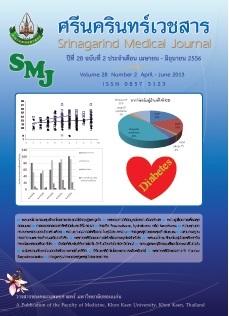Factors Associated with the Uptake of Influenza Vaccine Among the Health Care Workers and Personal Staff in Faculty of Medicine, Khon Kaen University
Keywords:
factors, influenza vaccine, health care workers (HCWs) and hospital staffAbstract
Background and objective: Health care workers (HCWs) are at a high risk for influenza infection and spread to patients. Although immunization is beneficial and effective in protecting influenza infection and reducing nosocomial and public transmission, the uptake of vaccination among HCWs, a case study, remains low. No evidence bases reveal which factors affect the uptake of influenza vaccine. Thus, this study aims to examine factors associated with the uptake of influenza vaccine among HCWs and hospital staff, explore the desire of influenza vaccination among samples and assess the sources of influenza vaccine information.
Methods : Research design was case-control study set in Faculty of Medicine, Khon Kaen university. Study population were HCWs and hospital staff, 1105 staffs who had got influenza vaccination in 2010 (case) and 3081 staffs who hadn’t got vaccination in 2010 (control), worked during 6-24 June 2011 at Faculty of Medicine, Khon Kaen University. Sample size calculation reveal, 72 cases and 144 controls, were randomized by using systematic sampling method. A self-administered questionnaire, composed of personal information, factors that affecting uptake of influenza vaccine, sources of influenza vaccine information, desire of influenza vaccination and other comments. Data were analyzed by using SPSS-PC v15.0, Epi info for DOS v6.0, and Epi info for Windows v3.5 and were described into analytical statistics (i.e. Pearson Chi-Square, Fisher’s exact test, Mann-Whitney U-test).
Results : The response rates were 77.8% (56/72) in cases and 80.6% (116/144) in controls. The survey showed that in case, 14.3% were male and 85.7% were female and in control, 25% were males and 75% were female. For the staff who had patient contact, revealed 80% in case and 68.9% in control. According to the multiple logistic regression analysis, statistically significant factors affecting influenza vaccination under influencing factors control, are a history of vaccination before 2010 (AOR=3.74, 95% CI: 1.71, 8.19, p=0.001), and understanding of influenza and influenza vaccination (AOR=2.66, 95% CI: 1.17,6.01, p=0.019). The study, regarding the desire of influenza vaccination of HCWs and hospital staff in 2011, showed that 98.2% in case and 62.2% in control will get vaccination. The studies in response to staff’s main sources of influenza vaccination information were from colleagues, poster, and circular notice in case and colleagues, poster, television or newspapers, in control.
Conclusions : Factors associated with influenza vaccine uptake among HCWs and hospital staffs were a history of vaccination before 2010 and understanding of influenza and influenza vaccination. The desire of influenza vaccination remained high in staff who had were vaccinated in 2010, but remained low in the staff who were not. Main sources of information were from colleagues and poster. Moreover, circular notice was another source, recommended to increase the vaccination rate.
Keywords: factors, influenza vaccine, health care workers (HCWs) and hospital staff




